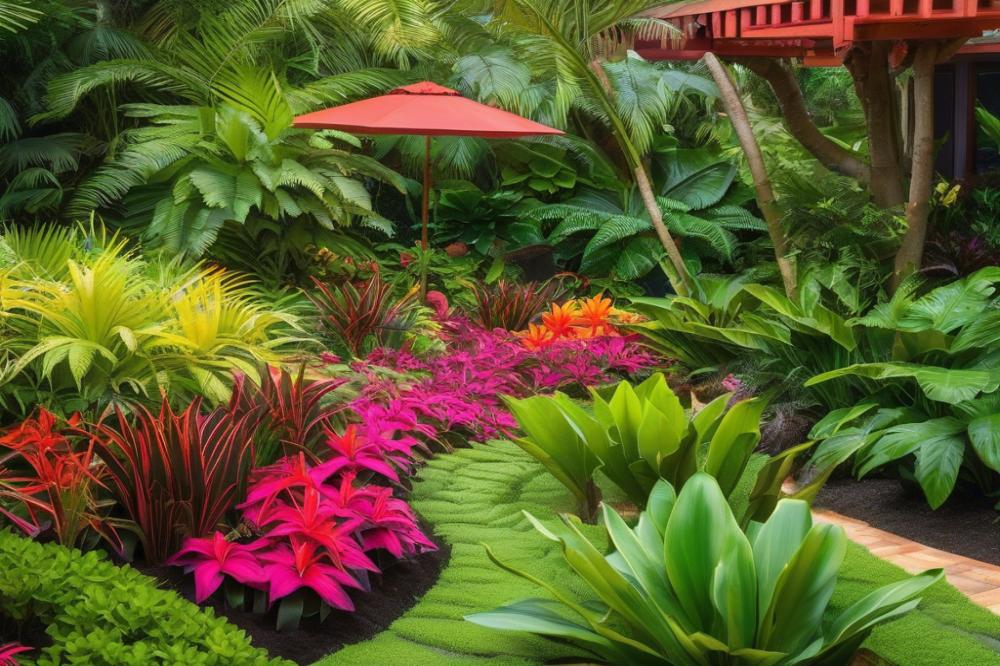Importance of mulch in Tropical gardens
The role of mulch in maintaining Tropical gardens cannot be overstated. In regions with high humidity, moisture retention becomes crucial for healthy plant growth. Without effective methods to keep water in the soil, gardens can suffer during dry spells. Organic materials help mitigate this issue, significantly benefiting both the plants and the soil.
One of the best things about using organic mulch is how it supports soil health. It adds nutrients as it decomposes and improves soil structure. This process can lead to better water absorption and retention, making it easier for plants to thrive. With tropical landscaping, the right mulch types also reduce the need for frequent watering, which is a significant advantage in these humid climates.
Weed suppression is another benefit of applying organic mulch. By covering the soil, it prevents weeds from taking hold, reducing competition for available moisture and nutrients. This contributes to easier garden maintenance, allowing gardeners to focus on cultivating their plants instead.
Embracing sustainable gardening practices is essential for preserving the unique ecology of tropical regions. Using mulch not only aids in plant growth but also promotes a healthier environment. Every layer of organic matter acts as a buffer, helping to retain moisture and nurture the ecosystem within the garden. Therefore, choosing to employ organic materials in your gardening routine can have lasting effects that extend beyond the beauty of plants.
Understanding Mulch
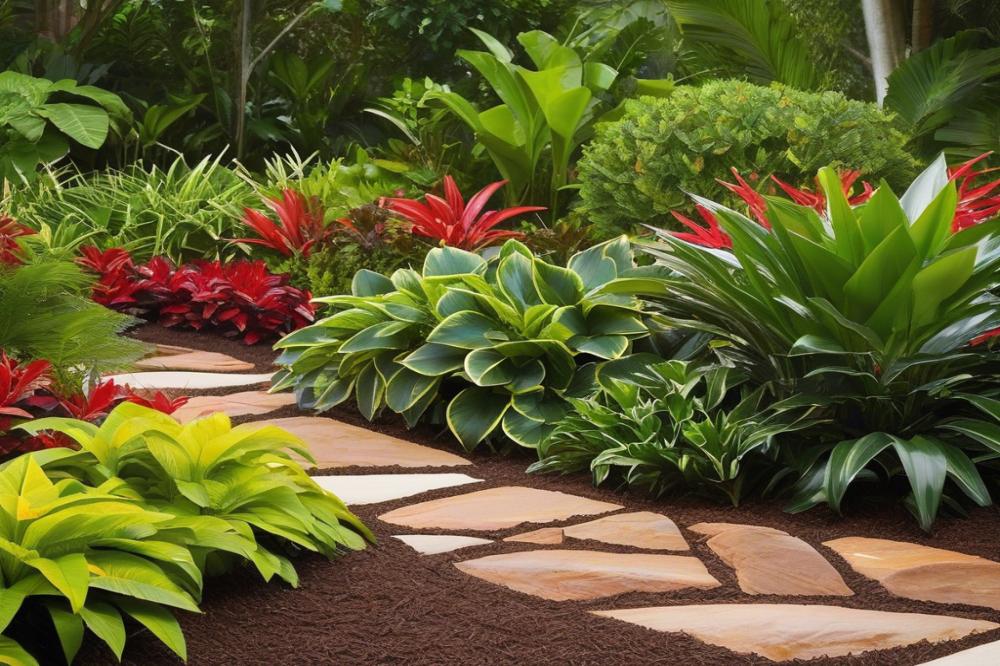

Mulch refers to any material applied to the surface of soil. Its primary purpose is to cover the garden bed, which helps retain moisture. This is especially important in tropical gardening, where the heat and humidity can quickly dry out the soil. Using it effectively can reduce the need for frequent watering.
In tropical landscaping, maintaining soil moisture is crucial for plant growth. High temperatures and intense sunlight can cause plants to lose water rapidly. Thus, applying a thick layer of mulch aids in keeping the soil damp. This leads to healthier plants that can withstand stress from the environment.
Different types of mulch exist, each with specific benefits for soil health. Organic mulch, such as wood chips or shredded leaves, breaks down over time. This decomposition adds nutrients back into the soil, promoting a richer ecosystem for plants. Other mulch types, like rubber or gravel, do not decompose but can still provide significant advantages, such as weed suppression.
Weeds compete for moisture and nutrients, making it harder for desirable plants to thrive. Applying a layer of mulch can inhibit weed growth, allowing your garden to flourish without unnecessary competition. This aspect significantly contributes to easier garden maintenance, saving time and energy for gardeners.
Moreover, a well-chosen mulch type can enhance soil structure. Organic options improve aeration as they decay, allowing roots to expand and absorb water effectively. This organic matter plays a vital role in maintaining moisture levels during dry spells.
Ultimately, selecting the right mulch is critical in tropical settings. With the right approach, gardeners can create sustainable gardening practices that benefit their plants and the environment. A thoughtful application not only conserves moisture but also supports robust soil health.
moisture retention Techniques
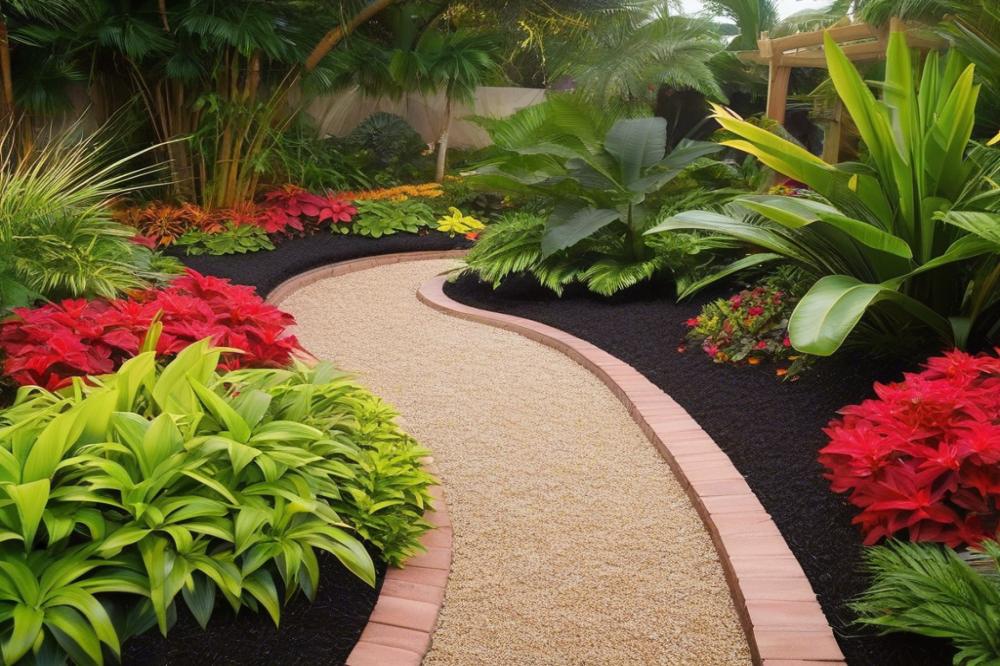

How Mulch Helps Retain Moisture in Tropical Gardens
Tropical gardens often face the challenge of high temperatures and intense sun. This environment can quickly dry out soil, making moisture retention crucial. By laying a protective layer on the soil, gardeners create a barrier. Water evaporates less rapidly from the ground. This leads to healthier plants and consistent hydration. Moreover, earthworms and beneficial organisms thrive beneath the surface, enhancing soil health.
Comparison of Organic vs Inorganic Mulch for Humidity Maintenance
When considering mulch types, both organic and inorganic options exist. Organic materials like wood chips, straw, and leaves decompose over time. They enrich the soil with nutrients. These are beneficial for plant growth and overall garden maintenance. On the other hand, inorganic options such as stones or plastic do not break down. While they effectively prevent weeds and keep the soil cool, they lack the ability to enrich soil health. Both types can help with moisture retention, but organic mulches add extra nutrients, which can be a boon for tropical landscaping.
Strategies for Effective Moisture Retention with Mulch
Effective mulch application involves several strategies. First, apply a layer that is about two to four inches thick. This thickness is optimal for moisture retention and weed suppression. Ensure the mulch is spread evenly around plants. Avoid piling it against stems or trunks, as this can harm the plants. Additionally, consider the specific needs of the plants in your garden. Some may prefer more moisture, while others thrive in slightly drier conditions. Choosing the right type of mulch, based on your garden’s unique requirements, promotes a more sustainable gardening approach. Regularly check the depth and condition of the mulch. Over time, materials may break down and require replenishment to maintain effectiveness.
Choosing the Right Mulch Types
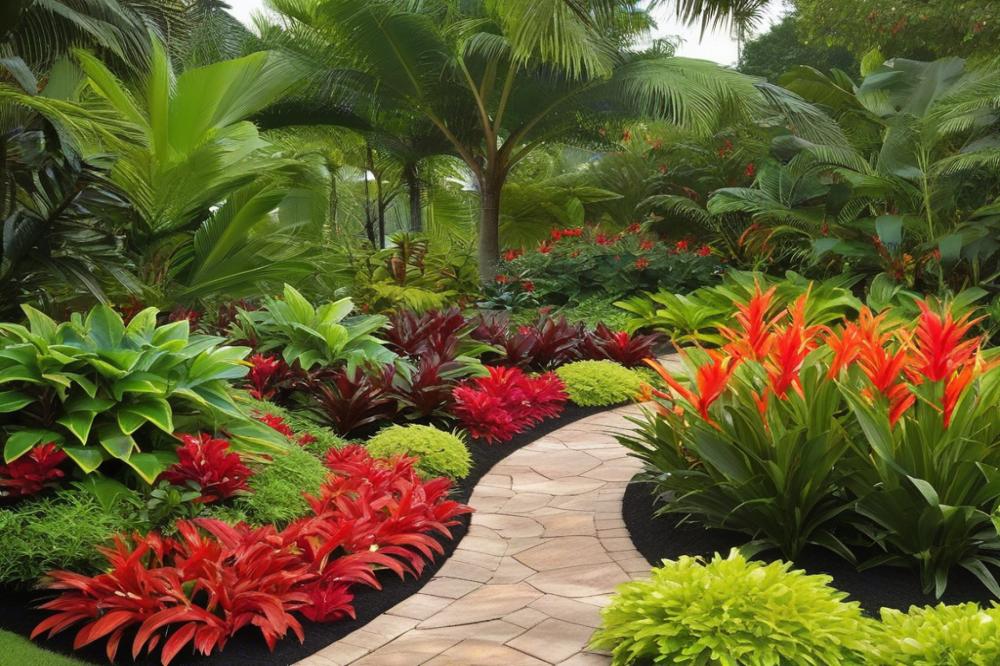

Common Types of Organic Mulch for Tropical Gardens
Organic mulch options flourish in tropical environments. Options like shredded leaves, straw, and bark chips are popular. Coconut coir is another excellent choice, as it retains moisture well. Grass clippings break down quickly, providing nutrients to the soil. While wood chips can last longer, they might take time to decompose. Each type has its unique benefits for enhancing soil health and supporting plant growth.
Considerations for Selecting Suitable Mulch Materials
Selecting the right mulch types requires thoughtful consideration. The local climate plays a significant role, especially in regions with high humidity. Opt for materials that suit your specific garden layout. Availability can also affect your choice. Look for sustainable options that won’t harm the environment. Think about how often you want to engage in garden maintenance. Some mulches need replacement more frequently than others.
Benefits of Nitrogen-Rich and Carbon-Rich Mulches
Nitrogen-rich mulches offer growth-enhancing properties. They help plants thrive by adding essential nutrients to the soil. Examples include grass clippings and legume leaves. On the opposite end, carbon-rich mulches also hold importance. Straw and wood chips improve soil structure but release nutrients slowly. Both types serve different roles in your tropical landscaping efforts. Using a mix promotes balanced soil health and effective moisture retention. Additionally, they assist in weed suppression, creating a healthier environment for your plants to thrive.
Mulch Application and Garden Maintenance
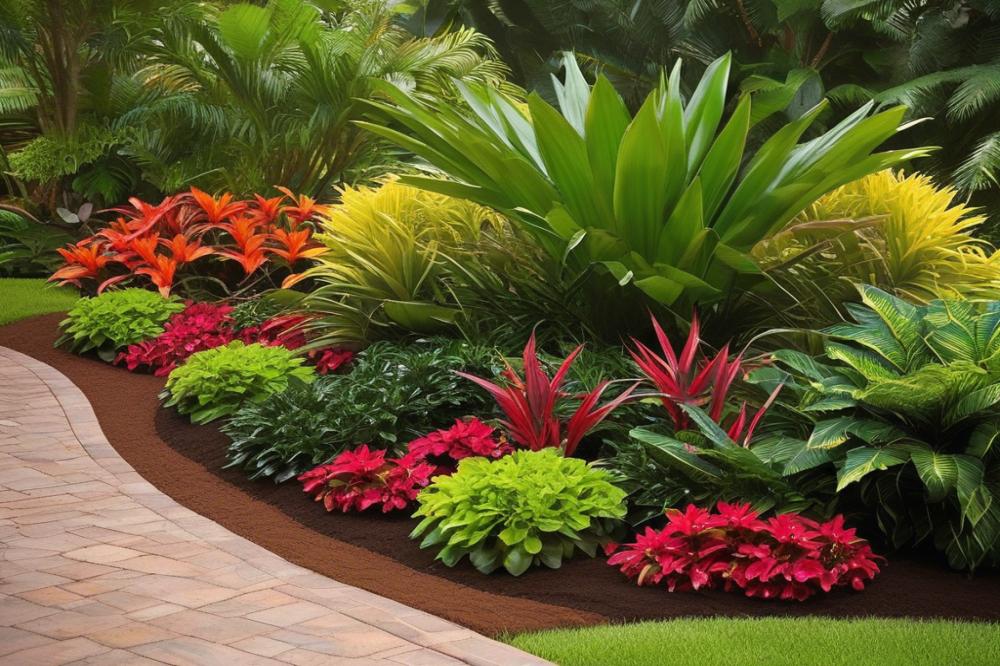

Best Practices for Applying Mulch in Tropical Gardens
Applying organic mulch contributes significantly to moisture retention in tropical gardens. Start by selecting suitable types of mulch such as wood chips, straw, or coconut husks. These materials break down over time, enriching soil health naturally. Spread a layer of 2 to 4 inches thick around plants, but keep it away from direct contact with stems. Doing so protects plants from rot and allows air circulation. Consider the unique climate of your area. Tropical locations often have high humidity, which can affect how quickly mulch decomposes. Regularly check the mulch layer. Replenishing it as needed helps maintain its effectiveness.
Maintaining Mulch Layers for Optimal Moisture Retention
Monitoring the mulch layer is essential for garden maintenance. Check for areas where the mulch has compacted or washed away after heavy rain. Fluffing it up can improve airflow and enhance moisture retention. This practice prevents the soil from drying out too quickly while allowing beneficial organisms to thrive. If you notice weeds starting to poke through, it might be time to add more mulch. Weeds compete for nutrients and water, so keeping them at bay promotes better plant growth. When maintaining your garden, always remember that a thicker layer offers greater benefits.
Combining Mulch with Other Garden Techniques for Plant Growth and Weed Suppression
Sustainable gardening often involves using mulch alongside other techniques. Companion planting can enhance the benefits of organic mulch. Certain plants naturally repel pests and can work well under a protective layer. Moreover, utilizing strategic plant placement can overshadow weeds and reduce their growth. Another effective method is incorporating drip irrigation systems. This setup allows water to reach plant roots directly while the mulch retains additional moisture. By combining these techniques, you can create a flourishing tropical landscape that thrives with minimal intervention. Always consider your unique environment and choose what works best for your garden.
Evaluating the Effects of Mulch
Monitoring soil health and moisture levels
Regular checks of soil health are important in any garden. Checking the moisture content helps understand how well the ground is retaining water. Use a soil moisture meter or your hands to feel the moisture. This can be done at various depths to assess evaporation and moisture retention. If the soil feels dry beneath the surface, it might need more organic matter. A dense layer helps keep moisture around the roots. High humidity levels in tropical regions can also affect how quickly water evaporates. Thus, understanding the balance is vital for optimal plant growth.
Adjusting mulch types and thickness based on seasonal changes
Different seasons bring changes in weather patterns. During the dry season, a thicker layer of organic matter can be beneficial. It protects the soil from the sun’s heat while retaining moisture longer. On the other hand, in the rainy season, it might be wise to thin out this layer. Too much material can block water from soaking into the ground effectively. Think about using different mulch types for varying conditions. For instance, shredded leaves might work well in the dry months, while grass clippings may be more suited for the wet ones.
Case studies or examples of successful mulch application in tropical gardens
Tropical landscaping thrives with the right techniques. Farmers in southeast Asia often utilize organic matter effectively for moisture retention. These gardeners have reported improved soil health and reduced need for watering. In their experiments, they noticed substantial plant growth along with better weed suppression. Another example can be found in home gardens in Central America. Here, the use of coconut husks paid off by retaining moisture amidst heat. These practical examples illustrate how gardeners can adapt their methods for better results. Drawing inspiration from these cases could lead to enhanced garden maintenance strategies in similar climates.
Wrapping Up the Benefits of Organic Covering
Recapping the advantages of using organic ground cover for moisture retention highlights its vital role in tropical gardening. It helps to keep the soil damp, reducing the frequency of watering. We also see that it minimizes weed growth, which can compete for nutrients and water. This simple method can lead to healthier plants while saving both time and resources.
Moreover, adopting this practice supports sustainable gardening methods. It allows gardeners to recycle organic matter while promoting a natural ecosystem in the soil. Not only does it enhance soil structure, but it also supports beneficial organisms that contribute to overall garden health. By embracing this technique, you are playing a part in protecting the environment.
Finding ways to maintain a tropical garden can be challenging, but this approach brings simplicity. Keeping your garden vibrant is key, and using ground cover achieves this. It offers an effective solution for garden maintenance in a humid climate. Think about how easy it can be to transform your garden into a flourishing paradise.
With these thoughts in mind, consider making this practice a routine part of your gardening efforts. Your plants will benefit, and you will enjoy a flourishing, healthy garden. Embrace the natural beauty of tropical gardening, and see how organic matter can improve your results.

